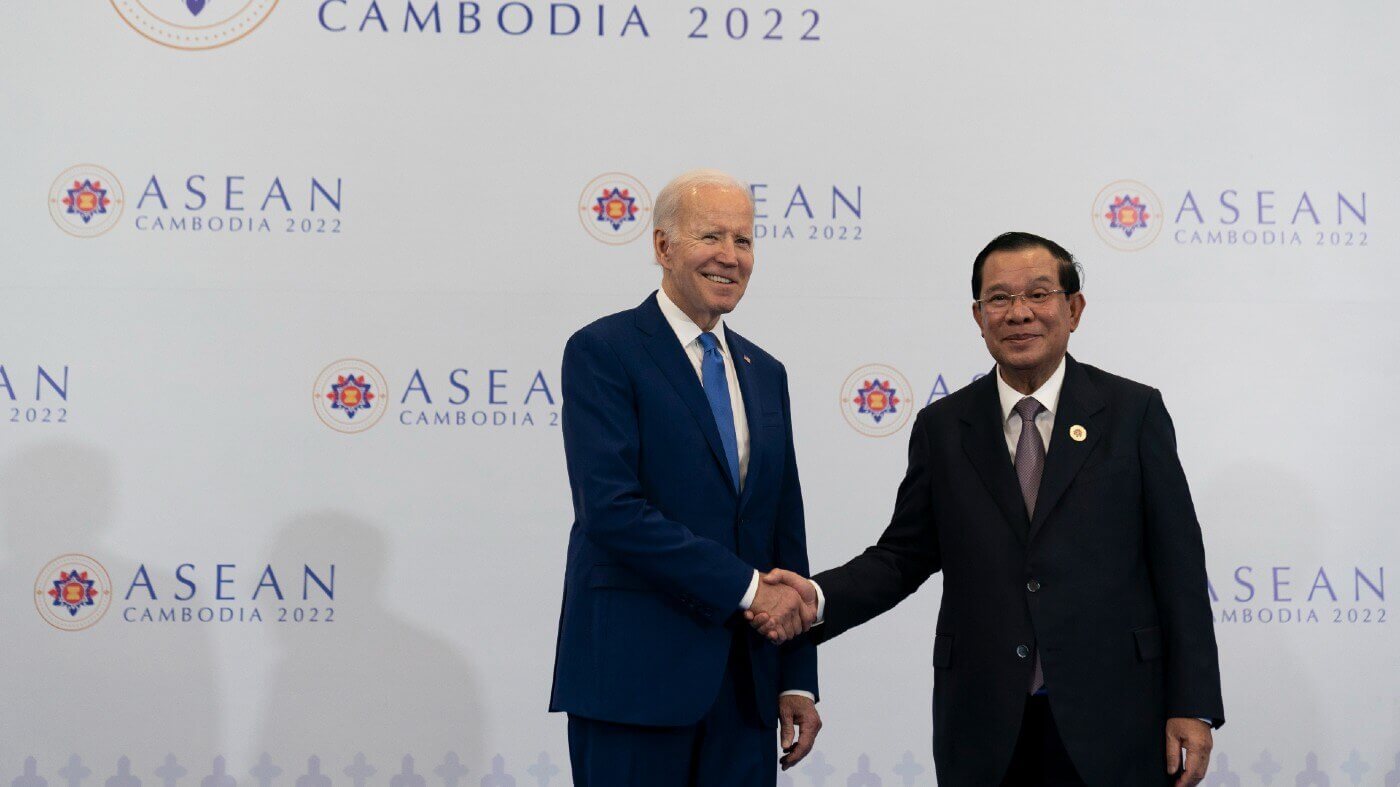During a press briefing on Monday, Chinese Foreign Ministry spokesperson Mao Ning rejected criticism by the United States (US) of China’s comprehensive strategic partnership with Cambodia, asserting that their cooperation is “open, transparent, legitimate, and justified.”
In particular, Mao took umbrage with concerns about China’s involvement in the Ream naval base, saying it is a “normal activity of providing assistance” and is only aimed at “strengthening the Cambodian navy’s capability of defending its maritime territorial integrity.”
Mao underscored that its involvement complies with international customary practices, as well as domestic laws in both countries.
President Biden met with Prime Minister Hun Sen of Cambodia to discuss the importance of ASEAN centrality. pic.twitter.com/VvlVLQTVCp
— The White House (@WhiteHouse) November 12, 2022
“It does not target any third party,” she stressed, adding that Phnom Phen has also made clarifications on the matter “on multiple occasions.”
In a thinly-veiled reference to the US, she expressed hope that “countries outside the region” would “view the normal exchanges and cooperation” between China and Cambodia “as they are.”
China’s firm rebuttal follows a meeting between US President Joe Biden and Cambodian Prime Minister Hun Sen on Saturday along the sidelines of the sidelines of the ASEAN summit in Phnom Penh.
I met with Prime Minister Hun Sen of Cambodia to discuss Cambodia’s leadership of ASEAN during a challenging year. I also reiterated the United States’ commitment to the Cambodian people and their aspirations for a more prosperous, democratic, and independent country. pic.twitter.com/zm55XN3YgW
— President Biden (@POTUS) November 12, 2022
According to a readout by the White House, Biden voiced his concern regarding “the situation” at the Cambodian base and “underscored the importance of full transparency about activities” by the Chinese military.
The US has long been wary of China’s dual-use infrastructure projects and the Chinese military’s possible presence and activities at the Ream Naval Base.
A 2019 report by the Wall Streer Journal revealed Beijing’s secret agreement with Cambodia to allow Chinese armed forces exclusive access to some parts of the naval base, which is situated along the Gulf of Thailand. However, the Chinese military denied these reports.
Chinese Premier Li Keqiang and Cambodian Prime Minister Samdech Techo Hun Sen held a meeting on deepening mutually beneficial cooperation yesterday. They inaugurated the Phnom Penh-Sihanoukville Expressway and attended the handover ceremony of its supporting livelihood project. pic.twitter.com/Oh4LUKVGvj
— Liu Yongfeng (@liupheonix) November 10, 2022
Suspicion in Washington grew after US Deputy Secretary of State Wendy Sherman, during a visit to Cambodia last June, questioned Hun Sen regarding China’s military presence in the country and requested clarification about the demolition of US-funded buildings at the base.
While Cambodia confirmed the demolition, calling it part of an upgrade, it denied China’s involvement. Suspicion rose once again a few days later after the US embassy in Phnom Penh said that its defence attaché had been denied full access to Ream during an invited visit.
On this basis, Washington accused Cambodia of not being transparent about Chinese construction activities at its biggest naval base. It also urged Phnom Penh to disclose the full scope of Beijing’s military involvement.
The US’ fears about Chinese encroachment appeared to be confirmed last October, when the Centre for Strategic and International Studies (CSIS), a Washington-based think tank, released satellite images of the base that highlighted construction progress in August and September 2021 and depicted several infrastructural changes at the base.
Li noted that China and Cambodia enjoy a deep traditional friendship, a high degree of political mutual trust, and fruitful practical cooperation in various fields. pic.twitter.com/uPfCLLN4Ho
— Chinese Mission to UN (@Chinamission2un) November 10, 2022
This prompted US embassy spokesperson Chad Roedemeier to assert that the presence of any foreign military at Ream would be a violation of the Cambodian constitution and undermine regional security. Cambodia once again denied the accusations to be “baseless.”
Soon after, in December, the US imposed an arms embargo and export restrictions on Cambodia, citing human rights abuses, corruption, and the growing influence of the Chinese military in the country.
“We urge the Cambodian government to make meaningful progress in addressing corruption and human rights abuses, and to work to reduce the influence of the PRC military in Cambodia, which threatens regional and global security,” said Commerce Secretary Gina Raimondo.
In retaliation to the move, the Cambodian PM ordered the country’s military to destroy any US weaponry or store them away in warehouses.
Meanwhile, the latest escalation in tensions comes at the heels of Chinese Premier Li Keqiang’s recent visit to Cambodia, during which he met with PM Hun Sen. As a testament of their “iron-clad friendship,” both sides signed more than ten bilateral cooperation documents related to the manufacturing, agriculture, and tourism sectors.
They also reiterated their commitment to “the basic norms governing international relations and international equity” and “rejecting any form of hegemonism and power politics, Cold War mentality, unilateralism and exclusionary circles, and interference in other countries’ internal affairs.”

